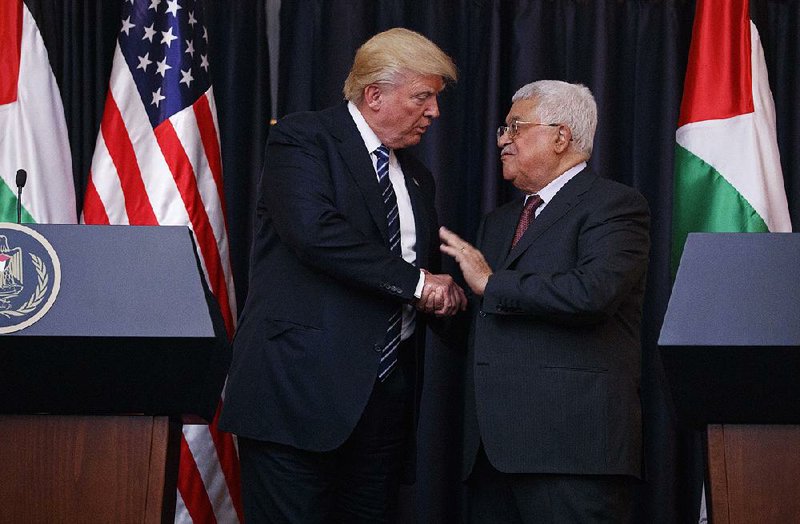JERUSALEM -- President Donald Trump told Israelis and Palestinians Tuesday that he knows they are eager to reach a peace agreement with each other, and that he is committed to helping them "make a deal."
In a speech at the Israel Museum as he prepared to end his four-day trip to the Middle East and depart for his next stop in Rome, Trump repeated his call for Arab countries and Israel to form a grand coalition with the United States to "drive out the terrorists and the extremists from our midst" and "defend our citizens and the people of the world."
"This trip is focused on that goal," he said.
Trump recognized that Israeli-Palestinian peace is a key component of cooperation in the region, although he has not outlined how he hopes to achieve an agreement that has eluded many presidents before him.
[PRESIDENT TRUMP: Timeline, appointments, executive orders + guide to actions in first 100 days]
In some respects, his effusive praise for Israel during his two days here -- which also included a Tuesday morning visit to Palestinian President Mahmoud Abbas in Bethlehem, on the Israeli-occupied West Bank -- appeared to endorse Israeli claims to a united capital in Jerusalem.
Noting that Jerusalem is a "sacred city," and that "the ties of the Jewish people to this Holy Land are ancient and eternal," Trump recalled his Monday visits to the Western Wall and the Church of the Holy Sepulchre, sites sacred to Jews and Christians that are located in East Jerusalem, part of the West Bank and claimed by Palestinians as the capital of their envisioned state.
To sustained applause, Trump cited the "unbreakable bond between United States of America and Israel" a place that he called "a testament to the unbreakable spirit of the Jewish people." He spoke movingly of "a future where Jewish, Christian and Muslim children can grow up together in peace."
"America's security partnership with Israel is stronger than ever," he said. "Under my administration, you see the difference. Big, big beautiful difference, including the Iron Dome missile defense program ... [and] David's Sling," an aircraft interception system. The former was established here under the Barack Obama administration, and the latter under former president George W. Bush.
The audience included U.S. and Israeli officials, as well as prominent citizens from both. Las Vegas casino mogul Sheldon Adelson and his wife, Miriam, who donated millions of dollars to support Trump's campaign and then his inauguration, were seated just behind the stage, near first lady Melania Trump and Secretary of State Rex Tillerson.
Before his speech, Trump and his delegation visited the Holocaust Remembrance Center at Yad Vasham, where he said the Jewish people had built the state of Israel out of the "depths of suffering" as "a testament to [their] unbreakable spirit."
Earlier, he traveled to Bethlehem for a private meeting with Abbas to discuss the peace process and his vision for anti-terrorism cooperation.
In joint remarks afterward, Abbas said he welcomed Trump's efforts, which had "given all the nations across the region so much hope and optimism of the possibility of making a dream come true."
"Our commitment is to cooperate with you in order to make peace and forge a historic peace deal with the Israelis," Abbas added.
But while Trump spoke in generalities about the goal, Abbas laid out the specifics of Palestinian demands -- which all have been supported by the Arabs and rejected by Israel through decades of unsuccessful peace negotiations shepherded by American presidents.
"We reassert to you our positions of a two-state solution along the borders of 1967, a state of Palestine with its capital in East Jerusalem, living alongside of Israel," he said, referring to Israel's occupation of the West Bank after a war against three Arab armies.
During the presidential campaign, Trump pledged to move the U.S. Embassy from Tel Aviv to Jerusalem, but the plan has been shelved, at least temporarily.
Abbas also spoke of Palestinian insistence that all "final status issues" be resolved "based on international law" and United Nations resolutions, as well as the Arab Peace Initiative first offered more than a decade ago. It promised Arab recognition of Israel in exchange for a Palestinian state.
After departing the Middle East, Trump's tour of the world's three main monotheistic religions will take him to the Vatican, where he will meet today with Pope Francis.
Papal visits with heads of state are carefully arranged bits of political and religious theater that follow a specific program, with little room for deviation or unwanted surprises. Trump will be given a tour of the Vatican after he arrives and will then first meet with the pontiff in his library. The two men will then be left alone with a translator to hold a private discussion before emerging again to exchange gifts and farewells. Trump will also view the Sistine Chapel.
Information for this article was contributed by staff members of The Associated Press.
A Section on 05/24/2017
